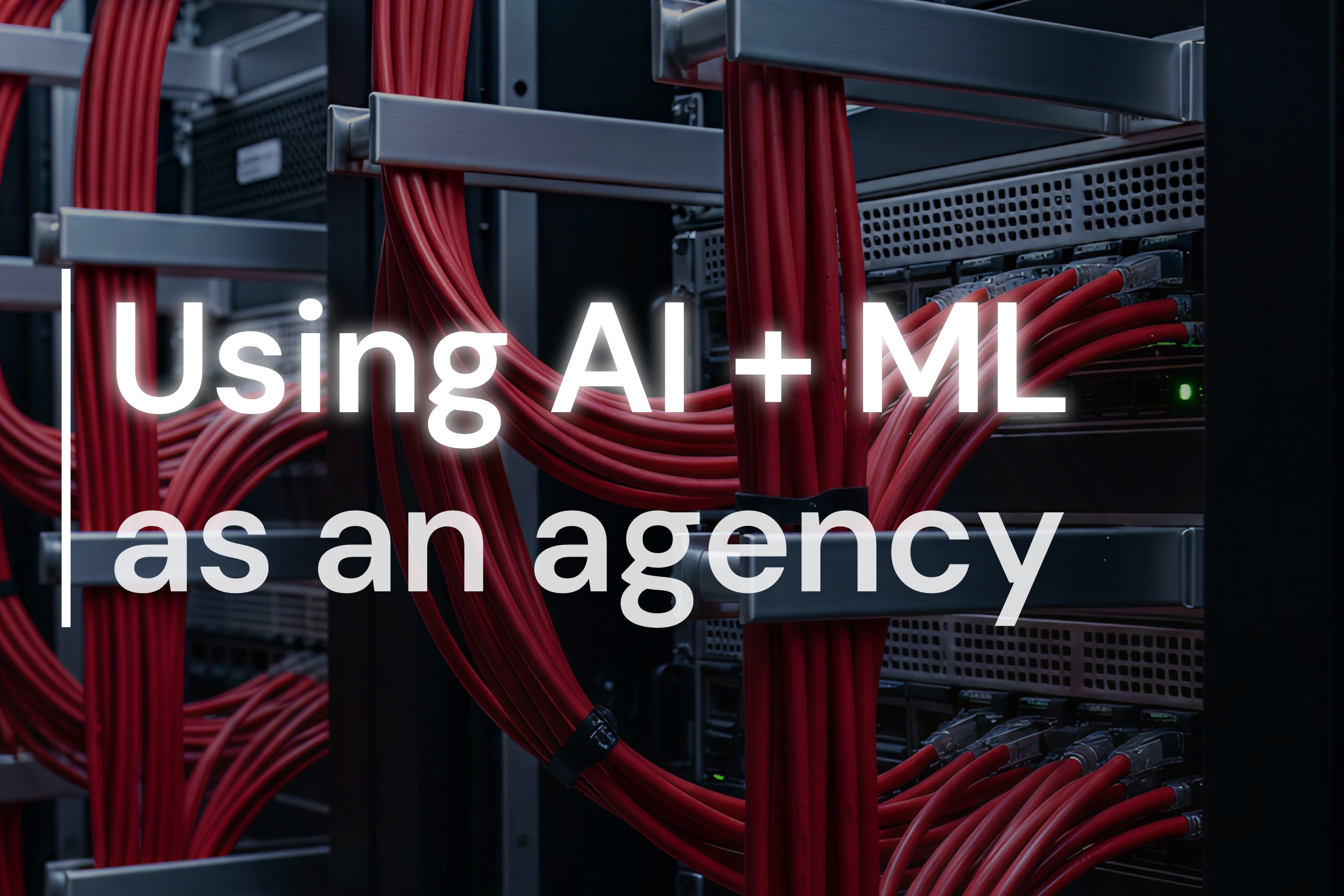In recent years, the rise of machine learning (ML) & artificial intelligence (AI) technologies has revolutionized the field of app design & development. AI tools such as OpenAI ChatGPT, Dall-E 2 & ChatSonic are enabling developers to create apps with more dynamic features, improved user experiences (UX) & more efficient search capabilities.
AI-driven apps are now able to use data to better understand user behavior & to offer personalized recommendations.
However, with the power of AI comes the fear of job replacement & potential privacy risks. 😱
In this blog, we'll take a dive into the role of machine learning & artificial intelligence in app development, the opportunities they create for programmers & the fears associated with them.

First things first... What is Machine Learning? 🤔
Machine learning is a type of artificial intelligence that enables machines to learn from data without being programmed explicitly. It's based on the idea that machines should be able to learn & adapt through experience. It works by using algorithms that can learn from data, identify patterns & make predictions.
💡 It's commonly used for predictive analysis, online recommender systems & Google search algorithms.
Perfect examples of websites that effectively use Machine Learning:
- Netflix: The movie & TV streaming giant uses machine learning to personalize its recommendations for each individual user. By analyzing your viewing history & the actions of similar users, the site can make highly accurate suggestions for what to watch next.
- Amazon: The e-commerce giant uses ML in a variety of ways to improve its customer experience, including personalizing product recommendations, automating inventory management & improving search results.
- Google Photos: Google Photos uses it to automatically organize & categorize all of your photos, making it easy to search & find specific pictures. It can also create animations & other visual effects using the photos in your library.
- Spotify: The music streaming service uses machine learning to power its "Discover Weekly" & "Release Radar" playlists, which serve up personalized recommendations for new music based on the listener's listening history.
- Facebook: The social media platform uses ML to personalize the news feed for each individual user, prioritizing posts from friends & pages that the user is likely to be most interested in. It also analyzes users' behavior & interests, allowing advertisers to target their ads to specific demographics & interests.
What is Artificial Intelligence? 🤖
AI, on the other hand, is a technology that enables machines to simulate human behavior. It's a larger concept that encompasses many different types of technologies, including machine learning & robotics.
We recently made a video about our top 5 AI tools that help us with various tasks and projects.
Check it out here:
👉 TikTok
No worries, we'll write it done for you as well. ✍️😇
- Open AI ChatGPT: This is a chatbot platform that allows us to easily build & deploy conversational AI bots for customer service, lead generation, & more. It's a powerful tool that helps us save time & improve the efficiency of our team.
- GitHub Copilot: is a code completion & suggestion tool that helps developers write code faster & more accurately. It uses machine learning algorithms to understand the context of the code being written & suggest appropriate next steps.
- Synthesia: is a tool that allows us to generate realistic, human-like text using AI. It's a great tool for creating content for social media, email marketing & more. 👉 Check it out here 🎬
- Fireflies AI: is an optimization tool that helps businesses improve the user experience & increase conversions on their website. It uses machine learning algorithms to analyze user behavior and suggest design & content changes that will improve the user experience.
- Grammarly: is a grammar & spelling checker that helps users write more clearly & accurately. It uses natural language processing to analyze text & identify grammatical errors, typos & other mistakes, making it a valuable tool for anyone looking to improve their writing skills.
At the end of this article, we'll add 5 more specific ML & AI tools for programming & app development.
SO, KEEP ON READING! 🤓
Different Techniques 🔍
By utilizing the latest AI & ML technologies, developers can create more user-centric apps & help businesses to automate their processes or improve the customer experience.
🔥 With the help of AI, mobile app development is entering a new era of possibilities. Here are some of these new techniques:
- Computer Vision technologies include techniques for analyzing & interpreting images, video & camera-based data. Enabling developers to build apps that can see & understand the world around them.
- Deep Learning techniques use neural networks to analyze large amounts of data & make predictions or decisions. It's being widely used in image, speech & text processing. It's being applied to more & more use cases in mobile app development.
- Robotics & Automation tools, enable developers to create apps that can perform tasks automatically, such as scheduling appointments, managing inventory or even making coffee. ☕
- Explainable AI (XAI) methods, allow developers to make models more interpretable, which is crucial for making critical business decisions & establishing trust with users.
The benefits of using ML & AI
AI-powered technologies can significantly improve the development of mobile apps, with benefits such as improved user experiences (UX), increased efficiency, better data analysis, reduced development costs & faster time-to-market.
WIN-WIN-WIN 🥳
👍 Improved user experiences (UX): create apps that are more dynamic & engaging.
👍 Increased efficiency: AI-enabled facial recognition technology can authenticate users in a more secure & convenient manner, support automated reply functions & provide real-time language translation capabilities.
👍 Analyze large amounts of data: Developers are now able to deliver personalized content, apps with predictive analysis, AI-generated recommendations & automated responses. It allows our devs to monitor user activity, analyze user behavior & track user trends. Allowing us to understand user needs & preferences better.
👍 Reduce development costs & improve time-to-market: With AI-powered tools & techniques, app development can be automated, allowing developers to focus on the creative aspects of the development process. This can lead to faster development times & ultimately faster time-to-market.
In short, AI technologies have the potential to revolutionize the way we interact with technology & can provide numerous benefits for mobile app development.

The impact on app design & development agencies
As a result of these advancements, app design & development agencies (like us 🤓) have had to adapt & evolve their skills to stay competitive in the industry. Our team now needs to have a deeper understanding of AI & machine learning in general, in order to be able to incorporate these technologies into our app development projects. This means that we're now faced with the challenge of keeping up with the latest AI & ML trends, tools & developments. Which requires continuous learning & skill development.
However, this also means that by doing this, we're able to fully embrace AI & ML in our app development processes, which is a significant advantage! We'll be able to deliver more advanced apps, which will help our client's businesses to stand out in the market.
The dangers & challenges that come with it... 😰
The biggest fear of the rise of AI in app development is job replacement concerns.
AI technology continues to evolve & automate many tasks, there are concerns that this could lead to job loss & displacement for certain workers. This could include developers, designers, marketers & other professionals who may be replaced by AI-powered tools & processes. (OH BOY🤯)
Moreover, with the rise of Machine Learning & Artificial Intelligence, it's also important to have a strong focus on ethical considerations. Agencies like us must ensure that the apps we create don't perpetuate bias or discrimination & that user data is collected, stored & used in a transparent & responsible manner. They're big issues of privacy concerns that come with using AI in app development. As AI-enabled apps collect & process vast amounts of data on users, there are concerns about the security of that data & how it's used. This could lead to legal & regulatory challenges for developers, as well as reputational risks for businesses.
💡 How we manage to do this, you can read in the following blog: 5 practices on how we keep your application & data safe
Using AI in app development brings a lot of benefits, but also comes with its own set of challenges. Developers must contend with the lack of available experts, the need to keep up with ever-evolving AI technology, job displacement concerns & potential privacy risks. It requires a deep understanding of ethical considerations & the ability to analyze, protect & store the data collected by AI-powered apps.
Future predictions & trends
In the next few years, we can expect to see AI-powered apps being used in a wide range of industries.
❤️ In healthcare, AI-powered apps will be able to analyze medical images, predict disease outcomes & provide personalized treatment plans.
💰 In finance, apps will be able to monitor investments, provide financial advice& detect fraudulent activity.
🛒 In retail, apps will be able to recommend products, offer personalized discounts & even assist with virtual try-on.
🚛 In transportation, apps will be able to optimize routes, reduce fuel consumption & provide real-time traffic updates.
Etc...
One of the major trends in app development is the integration of edge computing, this will allow for more efficient, real-time data processing. And... It's set to become even more important in the future, as more & more data will be generated by a wide variety of IoT devices. This will be the key factor in making many of the AI-powered apps possible, from self-driving cars to medical diagnosis.

5 Machine Learning & AI tools for programming
Machine Learning frameworks & libraries provide developers with a variety of pre-built models & algorithms that can be used for a wide range of tasks.
Here's a list of 5 interesting open-source Machine Learning libraries:
- TensorFlow: is an open-source machine learning library that provides a wide range of tools for building and deploying machine learning models. It's used by researchers, engineers & data scientists to create a wide range of applications.
- PyTorch: is known for its simplicity & ease of use, making it popular among researchers & students. It has a dynamic computational graph which makes it easy for researchers to experiment with new models.
- Scikit-Learn: It is a machine learning library for Python that's known for its simplicity & ease of use.
- XGBoost: It is a popular open-source library for gradient boosting. Gradient boosting is a machine learning technique that involves training a sequence of models to predict the outcome of an event.
- LightGBM: It is an open-source library for gradient boosting that's focused on high-performance & low-memory usage. It's known for its faster training speed & higher efficiency compared to other boosting libraries.
More & more interesting websites are being added every day. So feel free to look around on Google, or just ask ChatGPT 😇
Conclusion
With Machine Learning & Artificial Intelligence; developers can create powerful apps that understand user needs & preferences, provide accurate search results & offer personalized recommendations. As AI technology continues to advance, it will become even more capable of revolutionizing the way we interact with technology & access information.
The impact of AI on app design & development has been transformative, changing the way agencies like Nightborn work. But, it also delivers services & new opportunities for those willing to adapt & evolve.
The future of AI-powered app development is incredibly promising, and at Nightborn, we're excited to take on the challenge of shaping this future. 💪



.webp)